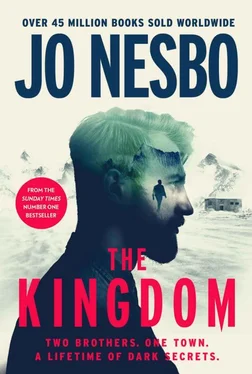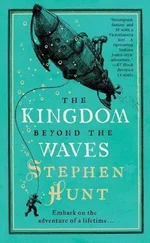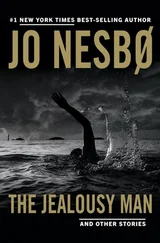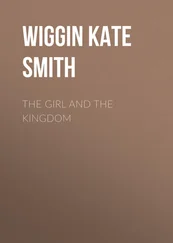‘Well, then let’s say that,’ she said.
Summer ended and the autumn was long and wet.
Rita rang once in October and once in November. I saw the R on the screen but didn’t take the call.
Uncle Bernard was hospitalised again. With each passing week he grew sicker, weaker and smaller. I worked too much and ate too little. Drove to the hospital in Notodden two or three times a week. Not because I thought I had to, but because I enjoyed the minimalist conversations I had with Uncle Bernard, and the long drives alone up and down the highway listening to J. J. Cale.
Carl came with me sometimes, but he had a lot to do. He and Mari had become the village’s glamorous couple. There were always things going on around them socially, and when I had the time I joined them. For some reason or other Carl liked me to come along, and on top of that it dawned on me I had no friends of my own. Not that I’d been lonely, or not had anyone to talk to, it was just something I didn’t do. Would have found it boring, preferred to spell my way through one of the books Rita had recommended and which I usually found in the library at Notodden. Since I read so slowly I couldn’t borrow too many at once, but what I did read I read thoroughly. On the Road. Lord of the Flies. The Virgin Suicides. The Sun Also Rises. The Wasp Factory . And I read out loud to Uncle Bernard from one called Post Office by Charles Bukowski, which made him – who had never read a book all the way through in his life – laugh so much he ended up having a coughing fit. Afterwards he looked tired. He said thanks for coming, but now it was best if I went.
And then came the day when he told me he was going to die. And followed that up with a Volkswagen joke.
And his daughter came and took the keys to the house.
I had expected Carl to start blubbing when I gave him the news about Uncle Bernard, but he seemed prepared for it, at least he shook his head sorrowfully for a while, as though it was something you could shake off. The way he seemed to have shaken off the Fritz night. Sometimes it seemed almost as though he had forgotten what had happened. We never spoke of it, as though we both understood that if we packed it in enough layers of silence and time it might one day become an echo from the past, like those flashbacks of old nightmares that for a fraction of a second seemed to have really happened, before you remember, and your pulse drops back down to normal again.
I told Carl I thought he should move into Mum and Dad’s bedroom, on the grounds that he was eight centimetres taller than me and needed a longer bed. But really it was because I slept so badly there in the boys’ room. Carl no longer heard the screams from Huken. Now I was the one hearing them.
Carl gave a long and wonderful eulogy for Uncle Bernard at the funeral, about how fine and genuine and funny he was. Maybe some people thought it was odd that Carl and not me, who was the older brother, spoke for us both, but I had asked him to do it, being afraid I would simply break down and cry. Carl said yes and got the material from me, all the anecdotes and thoughts, since I had been closer to Bernard than him. Carl had taken notes, written, rewritten, added his own lines, rehearsed in front of the mirror and really given the task his all. I had never realised he had so many refined thoughts in him, but then that’s how things are: you think you know someone like the back of your own hand, and then suddenly they show you sides of themselves you had no idea about. But the truth is that trouser pockets – even your own – are just a darkness you fumble about in. Now and then you find a ten-øre coin, a lottery ticket or a foil-wrapped aspirin in the lining. Or you can be so hopelessly in love with a girl that you’re on the verge of topping yourself, even though you don’t really know her. So you start wondering is that ten øre maybe just from yesterday, that love just something you’ve made up, that she’s just an excuse, a reason to go somewhere you long to go: anywhere that’s away from here? But I never drove further than the county line when I just wanted to think, or to Notodden, if I wanted to borrow books. Never thought about driving into the mountain by the tunnel opening at the end of that long, straight stretch, or doing a repeat of what happened up at Huken. I always came back. Ticked off one day and waited for the next. One where I would see Mari, or I wouldn’t see Mari.
It was around this time I started hitting people.
THE PERIOD AFTER UNCLE BERNARD’S death was a bleak time. I had taken over the workshop and was working all hours, and I think that was what saved me. That, and the fighting at Årtun.
The only relief were those Saturday-evening dances, with Carl getting drunk and flirting and me waiting for some poor jealous bastard to lose control so I could plant my fist in my own, pathetic mirror-image, punch it to the ground over and over again, week in and week out.
It was often the early hours of the morning before we got home from those Saturday night dances. Carl would collapse on the lower bunk, hung-over, farting and giggling. And once we had finished going through the night’s adventures he might exclaim:
‘God but it’s good to have a big brother!’
And that warmed my heart, even though it was a lie. Because we both knew that by now it was him who was the big brother.
Not once did it occur to me to tell him I was in love with his girlfriend. I hadn’t told Uncle Bernard either, or given any sign at all to Mari, obviously. The shame I felt was something I had to bear alone. I could hardly even endure my own reflection in the mirror. Was that something Dad had felt too? Had he thought that a man who lusts after his own son doesn’t deserve to fucking well live, and left that shotgun outside the barn in the hope that I would do it for him? I believe I understood more of him now, and it scared all kinds of hell out of me, and didn’t exactly do anything to lessen my self-contempt.
I can’t remember much of what I thought or said when Carl told me he wanted to study. It was actually pretty obvious, not just because of the good marks he used to get at school, or the fact that he wasn’t especially practical, but because Mari was equally obviously destined to be a student. And of course they would be students in the same city. I’d imagined the two of them sharing a little flat in Oslo or Bergen, coming back home to the village together in the holidays and hanging out with the old crowd. And I’d be hanging out with them too.
But then came that business with Grete and Carl at Årtun, Grete telling all to Mari, and suddenly everything was turned upside down.
And when Carl disappeared to Minnesota I was left with the feeling that he’d run out on the whole business. From the little village scandal and Mari Aas. From his responsibilities on the farm. From me, who had become more dependent on him than he was on me. And for all I know, maybe he’d started hearing them again, those screams from Huken.
At least it was quiet after he left.
Damn quiet.
The oil company bought the workshop and the land and suddenly I – a lad in his early twenties – was running a service station. I don’t know if they noticed something I’d never noticed myself, but anyway I worked round the clock. It wasn’t because I was particularly ambitious, that came later. But because I found it harder than expected to deal with being up there on the farm, listening to Huken and to the golden plover’s song of loneliness. A bird on the lookout for company. Not a friend, necessarily, just company. All of that could be dealt with by being at work, having people around me, having sounds, things to do, having my thoughts somewhere they could be put to use, and not just grinding round and round the same old crap.
Читать дальше












